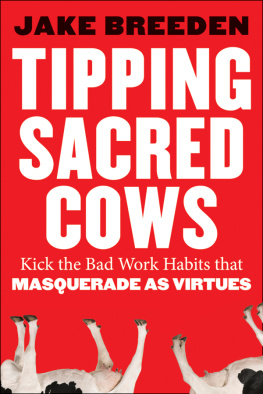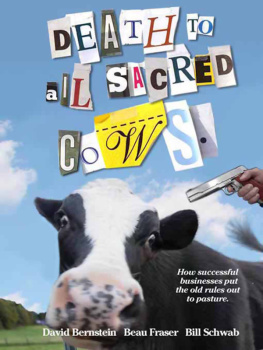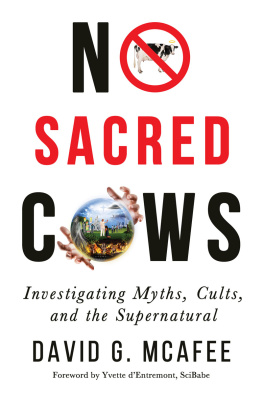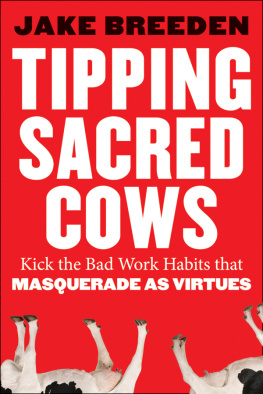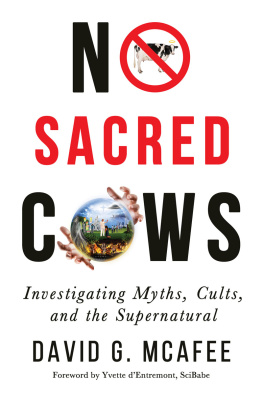
Cover design by Adrian Morgan
Cover image: Thinkstock (RF)
Copyright 2013 by John Wiley & Sons, Inc. All rights reserved.
Published by Jossey-Bass
A Wiley Imprint
One Montgomery Street, Suite 1200, San Francisco, CA 94104-4594 www.josseybass.com
No part of this publication may be reproduced, stored in a retrieval system, or transmitted in any form or by any means, electronic, mechanical, photocopying, recording, scanning, or otherwise, except as permitted under Section 107 or 108 of the 1976 United States Copyright Act, without either the prior written permission of the publisher, or authorization through payment of the appropriate per-copy fee to the Copyright Clearance Center, Inc., 222 Rosewood Drive, Danvers, MA 01923, 978-750-8400, fax 978-646-8600, or on the Web at www.copyright.com. Requests to the publisher for permission should be addressed to the Permissions Department, John Wiley & Sons, Inc., 111 River Street, Hoboken, NJ 07030, 201-748-6011, fax 201-748-6008, or online at www.wiley.com/go/permissions.
Limit of Liability/Disclaimer of Warranty: While the publisher and author have used their best efforts in preparing this book, they make no representations or warranties with respect to the accuracy or completeness of the contents of this book and specifically disclaim any implied warranties of merchantability or fitness for a particular purpose. No warranty may be created or extended by sales representatives or written sales materials. The advice and strategies contained herein may not be suitable for your situation. You should consult with a professional where appropriate. Neither the publisher nor author shall be liable for any loss of profit or any other commercial damages, including but not limited to special, incidental, consequential, or other damages. Readers should be aware that Internet Web sites offered as citations and/or sources for further information may have changed or disappeared between the time this was written and when it is read.
Jossey-Bass books and products are available through most bookstores. To contact Jossey-Bass directly call our Customer Care Department within the U.S. at 800-956-7739, outside the U.S. at 317-572-3986, or fax 317-572-4002.
Wiley publishes in a variety of print and electronic formats and by print-on-demand. Some material included with standard print versions of this book may not be included in e-books or in print-on-demand. If this book refers to media such as a CD or DVD that is not included in the version you purchased, you may download this material at http://booksupport.wiley.com. For more information about Wiley products, visit www.wiley.com.
Library of Congress Cataloging-in-Publication Data
Breeden, Jake, 1972
Tipping sacred cows: kick the bad work habits that masquerade as virtues / Jake Breeden. First edition.
pages cm
Includes bibliographical references and index.
ISBN 978-1-118-34591-7 (cloth); ISBN 978-1-118-53190-7 (ebk.); ISBN 978-1-118-43192-4 (ebk.); ISBN 978-1-118-43191-7 (ebk.)
1. Organizational effectiveness. 2. ManagementPsychological aspects. 3. Performance. I. Title.
HD58.9.B734 2013
650.1dc23
2012041895
first edition
To Emily, Clara, and Margaret.
Chapter 1
Meet Your Sacred Cows
I get paid to do my two favorite things: travel and teach. I love my work. Over the past ten years I've been to twenty-seven countries, working with some really smart, successful leaders at exciting companies. But there's something I love even more than my jobEmily, Clara, and Margaret, my three daughters.
I go into withdrawal if it's been too long since I've seen them. And there's one absolutely sacrosanct rule for me: never miss a birthday. Despite the intensity of my international travel, I made it through my oldest daughter Emily's first twelve years, my middle daughter Clara's first nine years, and my youngest daughter Margaret's first five years without ever missing a birthday, a perfect twenty-six for twenty-six. And then came Clara's tenth birthday.
I had to teach a two-week leadership development program in Dubai. I hated it, but I decided teaching the program and missing Clara's birthday was the only responsible thing to do. I sat down with her to discuss what I could do to make amends, knowing this was a negotiation I was bound to lose. I showed up with a heart full of guilt, ready to do whatever it took to placate my middle child. Clara, I'm going to be out of the country for your birthday, I said.
My double-digit birthday? she asked.
Yes, I swallowed. That one.
And then came the sobs. I hugged her. Daddy? she asked through muffled tears. Will you do anything I ask you to, to make up for missing my double-digit birthday?
I hesitated before asking a dangerous question: What do you want?
Daddy, she said, drying her big blue eyes as she pulled away from me. I want you to promise me that you'll miss Emily's thirteenth birthday.
I had expected to be looking into the price of Justin Bieber tickets. I was ready to give Clara something special, not take away something special from her sister.
Clara said I should miss Emily's birthday because it's fair. I was missing a special birthday for her, and I needed to make up for that by missing a special birthday for Emily. The way to make amends was to even the score.
Unwilling to start an endless chain reaction of missed birthdays, I took Clara to a theme parkone of her favorite and my least favorite things to do. When I stepped off the roller coaster quivering with nausea, Clara finally felt the score was even. Someone had to pay, and that someone was me.
None of us wants to be treated unfairly. From our earliest days, we, like Clara, have a sense that life should be fair and we protest or seethe when it's not. To even the scales, we demand something for ourselves. Failing that, we deny something for others. To be sure, fairness is a virtue, but when it's a virtue that trumps reason, it can backfire.
As it turns out, Clara's response was not unlike the typical responses of well-meaning adults. When they waste precious emotional energy fretting over relative office size, bonus packages, or mentions at the annual meeting, or when they demand that a junior employee go through the same trivial grunt work and dreadful schedule that they did, even if there's a better way, leaders make the same mistake as Clara. Sometimes worrying about who gets more than their fair share is a lot like tearfully asking your father to miss your sister's birthday.
Fairness is only one of several leadership virtues whose pursuit can reap unintended, injurious consequences. The truth is that many workplace values that seem beyond reproach actually do hidden damage. These are values that on the one hand give us life and direction, and on the other hand can steal our energy, effectiveness, and success. Like rocks in a river channel, these unexamined values can get in our way, impede our efforts, and even capsize us. Some leaders, however, become fully aware and steadily mindful of the downsides of their and their companies' most cherished and unquestioned virtues, and, in the process, renew their spirits, get more done, and enjoy more success.
Unexamined Virtues at Work
No detail escaped Julian Fletcher's watchful eye. As the COO of a small but growing consulting firm, he counted every penny, balanced every budget, and demanded that his employees operate with the same ruthless efficiency. And though Julian was successful in his role, he was often frustrated by the cavalier attitude of his boss, the CEO. When the CEO was recruited away to run a larger firm, Julian was promoted to the top position, and without wasting a second, he eagerly set out to tighten the ship.
Next page
